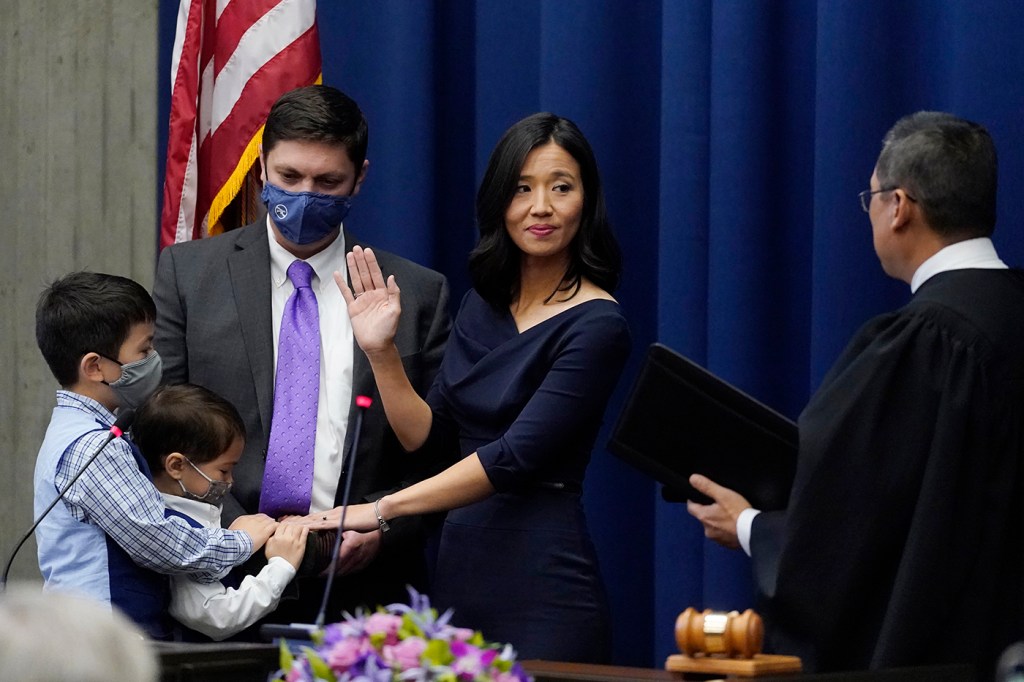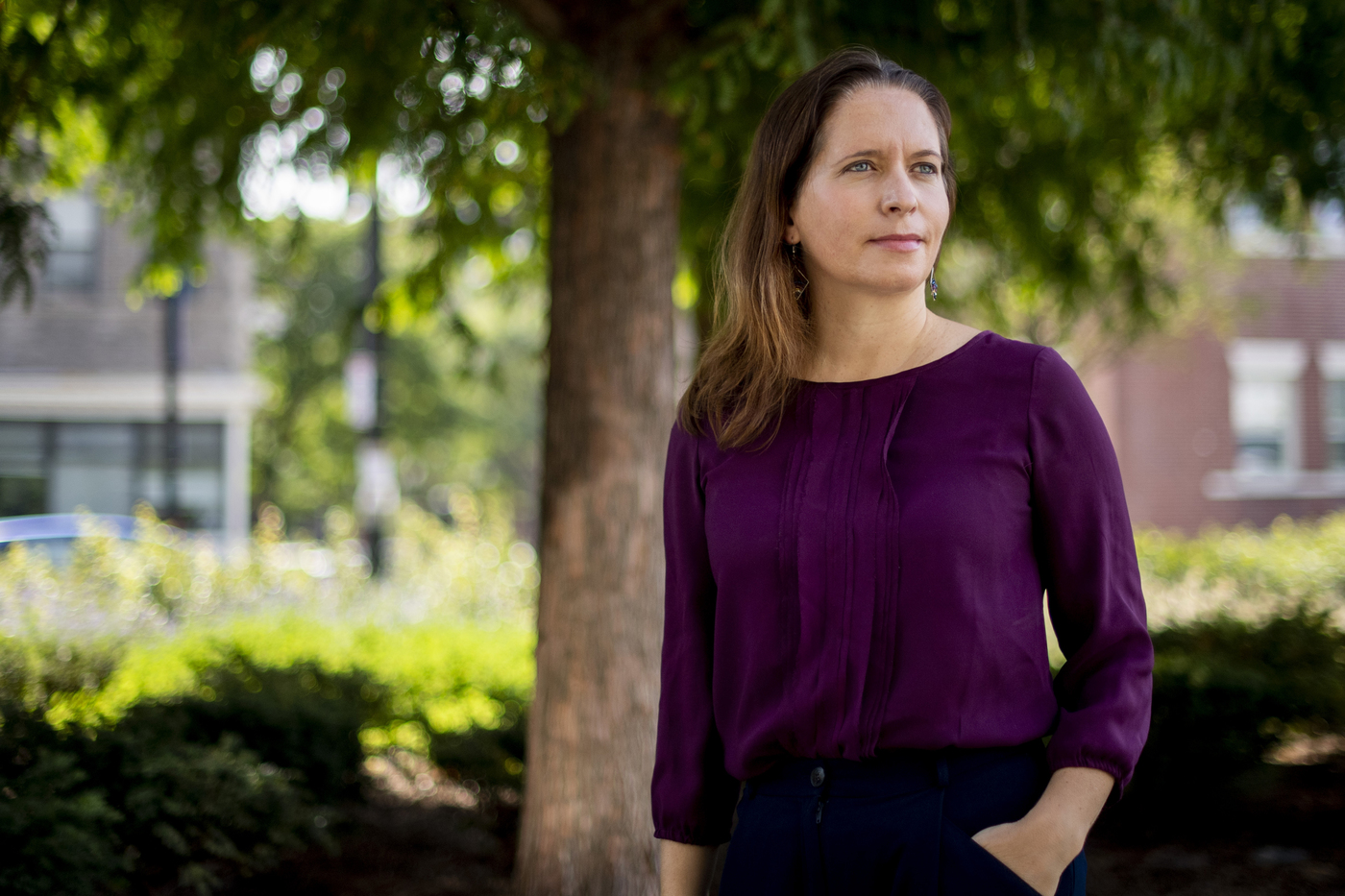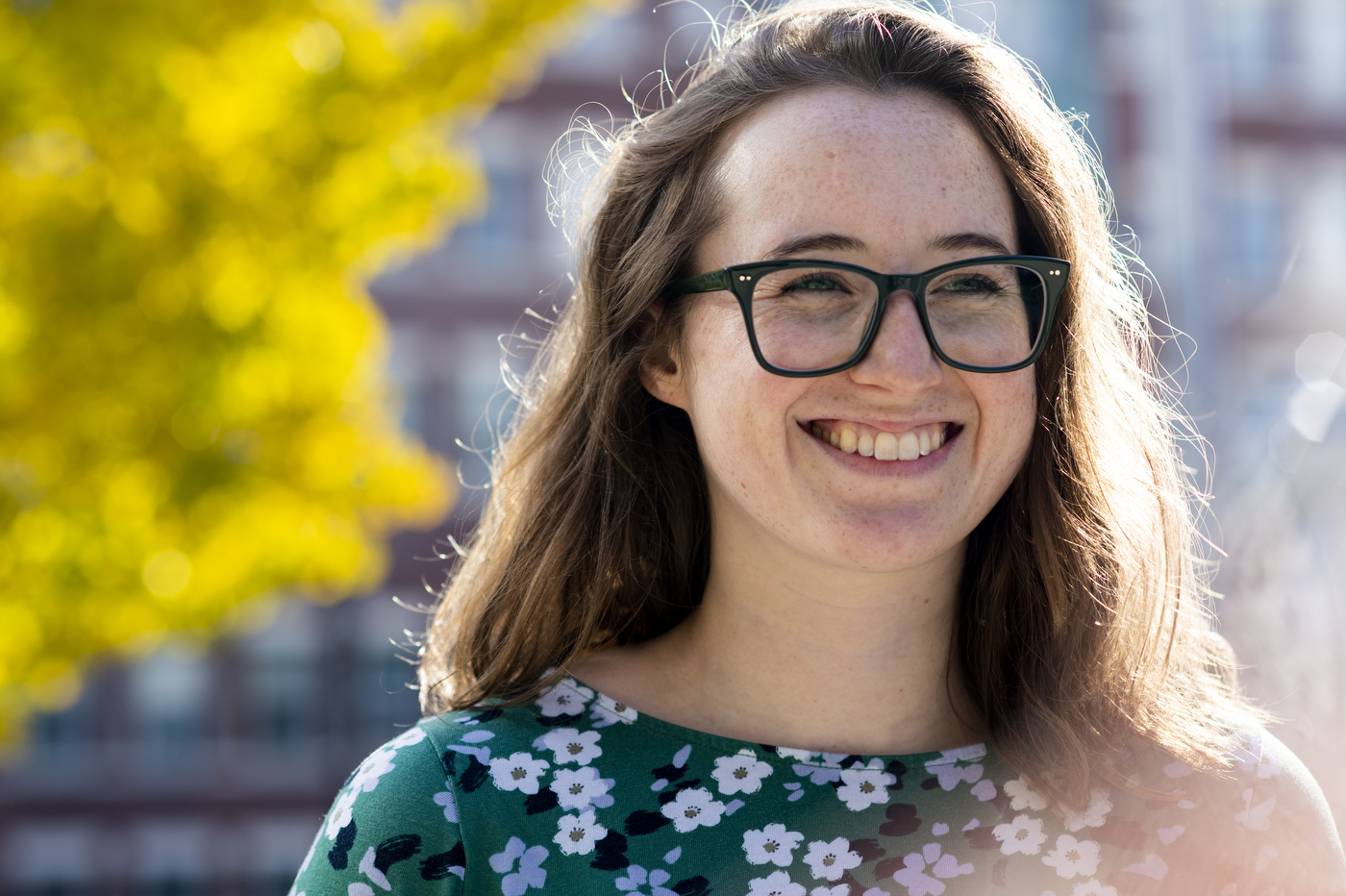When it comes to climate action in politics, Michelle Wu offers a way forward

As Michelle Wu takes office as Boston’s next mayor, she breaks through a lot of history: She’s the first woman and first person of color to be elected to the position. She’s also the first person to run on a Green New Deal platform and win an election for any executive office.
Over the summer, Wu released a report titled “Planning for a Boston Green New Deal and Just Recovery” that outlined her plan for dealing with climate change and the various other social issues with which it intersects, including affordable housing, economic opportunity, transportation, and racial justice.

Jennie C. Stephens, is dean’s professor of sustainability science and policy, and director of strategic research collaborations at the Global Resilience Institute. Photo by Matthew Modoono/Northeastern University
Wu’s plan—which was sometimes distilled among supporters to the rallying cry, “Free the T”—was nevertheless “the most detailed and specific of all the different Green New Deal policies that have been proposed at different levels of government, including regional, national, and state-level,” says Jennie Stephens, dean’s professor of sustainability science and policy.
Wu is already making good on her campaign promises. On Monday, she signed a measure intended to divest city funds from the fossil fuel industry.
Stephens, who is also director of the School of Public Policy and Urban Affairs, worked with a team of students including Alaina Boyle, Graham Leggat, Larissa Morikawa, and Yanni Pappas, to examine the new mayor’s policies. They compared her plans to other Green New Deal-style proposals across the U.S., Europe, and Canada, and published their findings this month in the journal Energy Research & Social Science.
“The wonderful and exciting thing about municipal and local government is that these governments are very connected to the public,” says Boyle, a doctoral candidate who also worked with Wu over the summer to co-author the report that underpins the mayor’s free public transport proposal. That connection makes a massive, global problem such as climate change actionable at a smaller level.
She and Stephens—who, together, wrote an op-ed on the topic—say that Wu’s historic win illustrates a path forward for climate-conscious candidates.
In your op-ed, you describe Wu’s Green New Deal as “a new kind of climate policy.” What makes it different?
STEPHENS: Mayor Wu’s approach to addressing the climate crisis is different because it is based on hope, social justice, and equity. The Green New Deal represents a new kind of climate policy that simultaneously addresses the climate crisis and economic injustice by focusing on holistic integrated public investments in people, households, and communities rather than more narrow climate policies like technology mandates, emission standards, or carbon taxes.
The idea is to invest in climate action in ways that reverse social inequities, racial injustices, and economic disparities.
Rather than seeing climate action as a daunting expensive proposition, the Green New Deal reframes the climate crisis and the need to accelerate decarbonization as an opportunity to invest in both physical and social infrastructure, including an urban climate corps and workforce training for green jobs; green municipal bonds to finance renewable and efficient energy projects; and free public transportation to reduce transit injustices.
Michelle Wu was the first candidate for major office to win on a Green New Deal platform. Why is that significant? What does it spell for future candidates?
STEPHENS: Michelle Wu has demonstrated how to build multiracial and multigenerational coalitions to support the more transformative policies that are needed. By centering climate and energy policy on the need for public investments in people and communities, her win opens up opportunities for future candidates to be more courageous and innovative.
Climate action and policy is so often framed on a national or even global level—but what role do cities like Boston, or even more granular neighborhoods, play in achieving those broad goals?
STEPHENS: Cities and towns play a huge role in accelerating climate action, because municipal governments and communities can be innovative and creative in locally appropriate ways. The critical role of cities in climate action became even more important after the Trump administration withdrew the United States from the global Paris Climate Agreement. In response, cities around the country ramped up their efforts as city leaders declared, “We are still in.”
BOYLE: Climate change tends to be framed at a national or international level because it is a global problem and feels overwhelming at smaller scales. However, we’ve seen limited ambition at higher levels of government—at COP26, for example, this was due to a consensus approach that lands on the lowest common denominator: fossil fuel interests.

Alaina Boyle is a doctoral student of public policy, sustainability and resilience. Photo by Alyssa Stone/Northeastern University
The wonderful and exciting thing about municipal and local government is that these governments are very connected to the public. Mayor Wu has spoken many times about how she loves to work on the little things like fixing potholes and talking to constituents about city services, just as much as she is excited about broad and innovative policy proposals like her Plan for a Boston Green New Deal and Just Recovery.
At the city level, policymakers can work on the implementation level and make an immense difference in cumulative mitigation (e.g. through Boston’s new emissions-reducing building code, BERDO 2.0) and adaptation planning (e.g. working with the constituents who live on a street where flooding is starting to happen) with constituent involvement in a way that really isn’t possible at other levels of government.
I think Mayor Wu sees these opportunities for city-level governance and has built her platform on a grassroots-heavy, people-first approach that includes lots of city-level changes that add up to big climate impacts—all in a way that will show other cities what is possible in terms of climate ambition and innovation.
In terms of running on a climate platform, what can we learn about Wu’s campaign?
BOYLE: First, she, like her mentor Sen. Elizabeth Warren, has a plan for everything—her policy proposals including the [Green New Deal], are incredibly detailed with regards to implementation and understanding what the city can do.
I don’t know if the Green New Deal was really the point that most resonated, but we learned last year from Sen. Ed Markey’s election that youth climate activists can have a major impact on elections in Massachusetts. So having the support and momentum of a climate grassroots group was probably a key one of several drivers for Mayor Wu’s election.
As a policy platform, can you explain how Green New Deal frameworks are different from other economic or market-based approaches to climate action?
BOYLE: In a paper I co-authored with Prof. Stephens and classmates, we looked at several climate policy plans that have been proposed at multiple levels of government in the U.S., Canada, and Europe. We found that even though there can be major differences between the proposed approach to implementation or mitigation and adaptation goals, all of the plans emphasized justice and equity. This is the heart of the Green New Deal.
Climate change is driven by systems of resource extraction that are typically sited in poorer communities and communities of color, which, due to local pollution from extraction processes, harms those communities. As delegates at COP-26 pointed out, the Global North is worried about what climate change will look like, but the world’s poorest countries are already dealing with its consequences, especially their most marginalized communities. Market-based approaches ignore the facts of where climate change is happening and who is most harmed.
On the other hand, a Green New Deal approach to policy is unique because it addresses these imbalances. Green New Deal policies emphasize the need for justice in the distribution of the benefits of economic investment in mitigation and adaptation activities, by prioritizing jobs and training in communities that have been historically under-invested, for example. GND policies also bake justice into the distribution of costs of climate change by prioritizing clean energy and water projects in those same communities. In this way, Green New Deals are transforming our systems toward greater equity and justice. Mayor Wu’s Green New Deal is impressive because it uses this approach to connect and build more justice in Boston from the food and housing systems to public transit and other more traditionally environmental domains.
What role can higher education play in addressing climate change?
BOYLE: I have been working with Prof. Stephens and another team of students on a project about climate justice in higher education. We have found that, as independent anchor institutions with substantial funding, universities have the capacity to lead on climate change just like Mayor Wu and the City of Boston.
One mayor with an outstanding climate plan can’t change the world alone; we need all of our institutions to take major action on climate change right now if we’re going to avoid catastrophic climate change in the coming decades, and universities as institutions for knowledge and the advancement of the public good, including Northeastern, should follow Mayor Wu’s example and lead that charge.
For media inquiries, please contact Ed Gavaghan at e.gavaghan@northeastern.edu or 617-373-5718.





